Partners who have made the choice to share their lives and a home without entering into marriage might consider drafting a cohabitation agreement. Essentially, a cohabitation agreement is a legal document outlining the rights and responsibilities of two individuals who have elected to reside together.
While certain aspects of their relationship, such as child support agreements or mortgage applications, may be treated similarly to a married couple, this is not always the case. For matters like pension benefits, property ownership, and inheritance, their legal status may be considered distinct.
Table of Contents
What Is a Cohabitation Agreement?

A cohabitation agreement is a legally binding document that outlines the rights, responsibilities, and financial arrangements for two individuals who have chosen to live together without getting married. This type of agreement aims to provide clarity and protection for both parties in the relationship, addressing various aspects of their shared life to avoid potential disputes or misunderstandings in the future.
The cohabitation agreement typically covers topics such as property division, financial responsibilities, and arrangements for shared expenses. It may also address issues related to children, if the couple has or plans to have any, including custody, visitation, and child support arrangements.
In the event of a separation, a cohabitation agreement serves as a valuable resource for navigating the legal process, as it establishes a clear understanding of each party’s obligations and entitlements. This can help to minimize conflicts and ensure a smoother, more amicable resolution.
Cohabitation Agreement Templates
Cohabitation agreement templates are pre-designed documents that provide a structured format for creating legal agreements between individuals who are living together in a committed relationship but are not married. These templates offer a convenient and organized way to establish rights, responsibilities, and expectations for both parties involved in the cohabitation arrangement.
Cohabitation agreement templates typically include sections that address important aspects such as property ownership, financial responsibilities, division of assets and debts, household expenses, and any specific provisions related to children or pets. They may also include sections for addressing dispute resolution, termination of the agreement, or other relevant considerations.
Using a cohabitation agreement template helps individuals in non-marital relationships protect their rights and interests by clearly outlining their mutual expectations and obligations. The template provides a framework for addressing common issues that may arise during the course of the cohabitation, promoting transparency and preventing future conflicts.
Benefits of Using a Cohabitation Agreement
As couples embark on the journey of cohabitation, they may find it valuable to establish a cohabitation agreement. This legal contract offers various advantages that can help provide stability and security in their relationship. By outlining the rights and responsibilities of each party, the cohabitation agreement fosters a strong foundation for the couple’s future together. In this comprehensive guide, we will delve into the numerous benefits of using a cohabitation agreement, highlighting the essential aspects that contribute to a harmonious and protected partnership.
Financial Clarity
A cohabitation agreement clearly defines each party’s financial responsibilities, such as rent or mortgage payments, utility bills, and other shared expenses. This transparency helps to avoid potential disputes over money, ensuring both partners are on the same page when it comes to their monetary obligations.
Asset and Property Protection
The agreement can outline how assets and property will be divided in the event of a separation. This ensures that both individuals have a clear understanding of their ownership rights, reducing the risk of disputes or unfair treatment during a potential breakup.
Child-Related Matters
For couples with children or plans to have them, the cohabitation agreement can address issues such as custody, visitation, and child support arrangements. This provides a solid framework for handling these sensitive matters, ensuring the best interests of the children are prioritized.
Debt Management
The agreement can stipulate how each partner’s pre-existing debts will be handled, as well as any debts incurred during the relationship. This helps to protect each individual from being held responsible for their partner’s financial liabilities.
Inheritance Planning
A cohabitation agreement can specify inheritance arrangements in the event of a partner’s death. This offers protection for the surviving partner, who may not have automatic inheritance rights if they are not married.
Legal Recognition
While not equivalent to a marriage, a cohabitation agreement does provide a degree of legal recognition to the couple’s relationship. This can be particularly beneficial when applying for loans, insurance policies, or other joint financial arrangements.
Conflict Resolution
Establishing a cohabitation agreement encourages open communication and negotiation between partners, fostering a healthy foundation for resolving disputes. In the event of a separation, the agreement serves as a valuable reference, guiding the couple towards a fair and amicable resolution.
Critical Matters to Address in Your Cohabitation Agreement
When crafting a cohabitation agreement, it is essential to address a range of issues that may arise during the course of a couple’s life together. By covering these topics in the agreement, both parties can establish a solid foundation for their relationship and mitigate potential disputes in the future. Here are some crucial issues to consider when drafting your cohabitation agreement:
Financial Contributions and Responsibilities
One of the primary concerns in any relationship is the management of finances. In a cohabitation agreement, it’s crucial to outline each party’s financial contributions and responsibilities, such as rent or mortgage payments, utilities, and household expenses. This will ensure that both partners have a clear understanding of their monetary obligations and help to prevent disagreements over finances.
Division of Assets and Property
Cohabitating couples often acquire assets and property together, which can become a contentious issue in the event of a separation. Your agreement should address how these shared assets will be divided in case the relationship ends, specifying the ownership rights for each party. This includes real estate, vehicles, furniture, and any other jointly-owned possessions.
Management of Debts
It’s essential to clarify how each partner’s pre-existing debts will be handled, as well as any debts incurred during the relationship. The agreement should specify whether these debts will remain separate or be considered joint liabilities. This helps to protect each individual from being held responsible for their partner’s financial obligations.
Child-Related Issues
If the couple has children or plans to have them, the cohabitation agreement should address issues such as custody, visitation, and child support arrangements. This provides a solid framework for handling these sensitive matters and ensures that the best interests of the children are prioritized.
Inheritance and Estate Planning
Inheritance rights for unmarried couples can be complex, and without proper planning, the surviving partner may not have automatic inheritance rights. Your cohabitation agreement should outline the inheritance arrangements for each party in the event of the other’s death. This might include specifying beneficiaries for life insurance policies, retirement accounts, and other assets.
Dispute Resolution
Every relationship experiences conflicts, and it’s important to establish a mechanism for resolving disputes in your cohabitation agreement. Consider outlining a process for mediation or arbitration to address disagreements that may arise during the relationship, as well as in the event of a separation. This can help to ensure a fair and amicable resolution for both parties.
Termination and Amendments
Lastly, your cohabitation agreement should include provisions for terminating or amending the contract. Specify the conditions under which the agreement can be terminated, such as a mutual decision to end the relationship or one party’s decision to move out. Additionally, outline the process for making changes to the agreement, ensuring that both parties have the flexibility to adapt the contract to their evolving needs.
When are Cohabitation Agreements Appropriate to Use?
Cohabitation agreements can provide a valuable framework for couples who decide to live together, offering legal clarity and protection for various aspects of their relationship. However, these agreements may not be suitable for every situation. Generally, cohabitation agreements are more fitting under the following circumstances:
Long-term commitment: You and your partner envision a long-lasting relationship and foresee living together for an extended period.
Significant assets or properties: Either or both of you possess considerable assets or properties upon entering the relationship.
Substantial debts: Either or both of you have significant debts as you begin your relationship.
Income disparity: There is a noticeable income difference between you and your partner.
Property acquisition: You or your partner expect to acquire property during the relationship.
Children involved: Either or both of you have a child as you enter the relationship, or you plan to have a child within the first two years of cohabitation.
Spousal support concerns: You anticipate spousal support being a potential issue if the relationship ends.
Conversely, cohabitation agreements may not be necessary or appropriate in situations where:
Youth: Both you and your partner are relatively young and still building your lives.
Lack of significant assets or properties: Neither of you has significant assets or properties upon entering the relationship.
No substantial debts: Neither of you has significant debts as you begin your relationship.
No children involved: Neither of you has children when entering the relationship, and you don’t plan to have children within the first two years.
Equal employment: Both partners work and plan to continue their careers.
When contemplating whether to establish a cohabitation agreement, consider the following questions to determine if clear answers are necessary:
How will household expenses be divided?
Will each partner be responsible for separate bills, or will expenses be shared?
Will separate bank accounts be maintained, or will there be a joint account for all expenses?
If a joint account is created, how much will each partner contribute?
How will household chores be divided? Will responsibilities be shared equally or rotated?
If children are involved, how will their care be managed?
Will the partner without children assume any parenting responsibilities?
If addressing these issues in an official document seems beneficial, a cohabitation agreement might be the right choice. This agreement can clarify important aspects of a couple’s relationship, preventing disputes over responsibilities and finances.
Additionally, the cohabitation agreement should specify what will happen if the couple decides to marry. Options include continuing the agreement, terminating it, or modifying the terms to better suit their new marital status.
Essential Legal Considerations for a Cohabitation Agreement
When drafting a cohabitation agreement, it’s crucial to be aware of the legal requirements that ensure its validity and enforceability. A well-crafted agreement will provide protection and clarity for both parties involved. Consider the following essential legal aspects when creating a cohabitation agreement:
Written document: Your agreement should be in writing rather than merely an oral agreement, as this provides a clear record of the terms and conditions.
Signatures and witnesses: Both partners should sign the agreement, ideally in the presence of a third-party witness. Although a witness is not always required, having one can enhance the agreement’s credibility.
Legal capacity: Both parties must be of sound mind and free from any legal disability when signing the agreement.
Clear rights and responsibilities: The agreement should clearly outline each partner’s rights and obligations within the relationship.
Voluntary participation: Both individuals must enter the agreement willingly, without coercion or pressure from the other party or external sources.
Full disclosure: Both partners should provide complete disclosure of relevant information, such as assets, properties, debts, and other pertinent details.
Legal compliance: The agreement must not contain any provisions that would require either party to engage in illegal activities or violate the law.
Legal counsel: If the agreement is prepared by one partner’s attorney, the other partner may seek advice or interpretation to ensure clarity and understanding.
Severability: If any portion of the agreement is found to be invalid, only that section will be voided, leaving the remainder of the agreement intact and enforceable.
Property, assets, and debts: The agreement should address how these items will be handled in the event the relationship ends, providing a clear roadmap for resolution.
Consulting with a legal professional is highly recommended when creating a cohabitation agreement. This ensures that the document is legally valid and enforceable. If you choose to draft the agreement independently, it’s still a good idea to consult an attorney afterward to review and confirm its legality.
FAQs
Who should consider a cohabitation agreement?
Couples who live together and have significant assets, debts, or children should consider a cohabitation agreement. Additionally, couples with substantial income disparities or those planning to acquire property during their relationship may benefit from such an agreement.
Are cohabitation agreements legally binding?
Yes, cohabitation agreements are legally binding, provided they meet specific legal requirements, such as being in writing, signed by both parties, and including full disclosure of relevant information.
Can a cohabitation agreement be enforced in court?
Yes, cohabitation agreements can be enforced in court if they meet legal requirements and are deemed fair and reasonable by a judge.
Can a cohabitation agreement be modified?
Yes, cohabitation agreements can be modified if both parties agree to the changes. It is essential to document any modifications in writing and have both parties sign the updated agreement.
What happens to a cohabitation agreement if the couple gets married?
Couples can decide to continue with the agreement, terminate it, or modify it to suit their new marital status. It’s crucial to address this scenario in the original cohabitation agreement.
Can a cohabitation agreement address child custody and support issues?
While a cohabitation agreement can address general child-related responsibilities, courts have the final say on child custody and support matters, prioritizing the child’s best interests.
Can a cohabitation agreement protect me from my partner’s debts?
Yes, a cohabitation agreement can protect you from your partner’s debts by explicitly stating that each partner is solely responsible for their own debts.
What happens to a cohabitation agreement if the relationship ends?
Upon the relationship’s termination, the cohabitation agreement remains enforceable, guiding the division of assets, property, and debts, and addressing any other agreed-upon terms.
Do I need a lawyer to create a cohabitation agreement?
While it is not required, hiring a lawyer is highly recommended when creating a cohabitation agreement. Legal professionals can ensure the document is legally valid, enforceable, and accurately reflects the couple’s intentions.
Remember, every couple’s circumstances are unique, so it’s crucial to seek legal advice tailored to your specific situation.
Can a cohabitation agreement include personal matters like household chores and responsibilities?
Yes, a cohabitation agreement can address personal matters such as household chores and responsibilities. However, these provisions may not be legally enforceable and should be considered more as guidelines for the relationship.
What if my partner and I are from different countries?
If you and your partner are from different countries, it’s essential to consult with legal professionals in both jurisdictions to ensure your cohabitation agreement is valid and enforceable in both locations.
How do I know if my cohabitation agreement is fair?
A fair cohabitation agreement should balance the rights and responsibilities of both partners, provide full disclosure of relevant information, and be entered into willingly by both parties. A legal professional can help ensure the agreement is fair and equitable.
Can we include a dispute resolution clause in our cohabitation agreement?
Yes, you can include a dispute resolution clause in your cohabitation agreement. This clause can outline the steps to be taken in case of a disagreement, such as mediation or arbitration.
Are cohabitation agreements recognized in all states?
Cohabitation agreements are generally recognized in most states. However, laws governing cohabitation agreements can vary from state to state. It’s crucial to consult with a legal professional familiar with your state’s laws to ensure your agreement is valid and enforceable.
What if my partner refuses to sign a cohabitation agreement?
A cohabitation agreement requires the voluntary consent of both parties. If your partner refuses to sign, you cannot force them. It’s essential to have an open and honest conversation about your concerns and the reasons for wanting a cohabitation agreement.
Can a cohabitation agreement cover future assets or property?
Yes, a cohabitation agreement can include provisions addressing future assets or property acquired during the relationship, specifying how these assets will be divided in the event the relationship ends.
Do we need to update our cohabitation agreement periodically?
It’s a good idea to review and update your cohabitation agreement periodically to ensure it remains accurate and relevant to your current circumstances. Major life events, such as the birth of a child, significant changes in income, or acquiring new property, may warrant updates to the agreement.
How do I terminate a cohabitation agreement?
A cohabitation agreement can be terminated by mutual consent of both parties. The termination should be documented in writing and signed by both partners.
Can a cohabitation agreement protect my inheritance rights?
A cohabitation agreement can help protect your inheritance rights by explicitly stating how each partner’s assets, including inheritances, will be treated in the event the relationship ends.
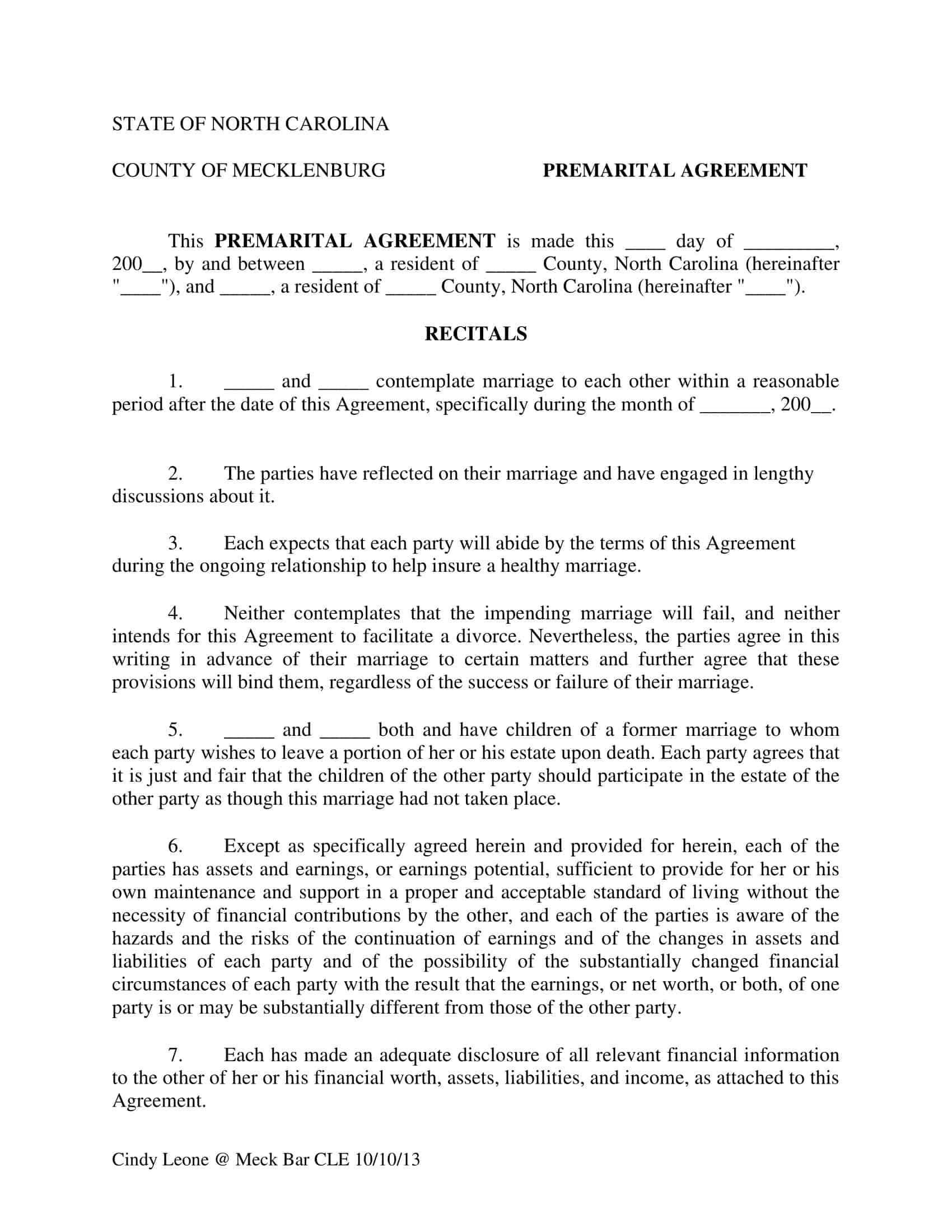



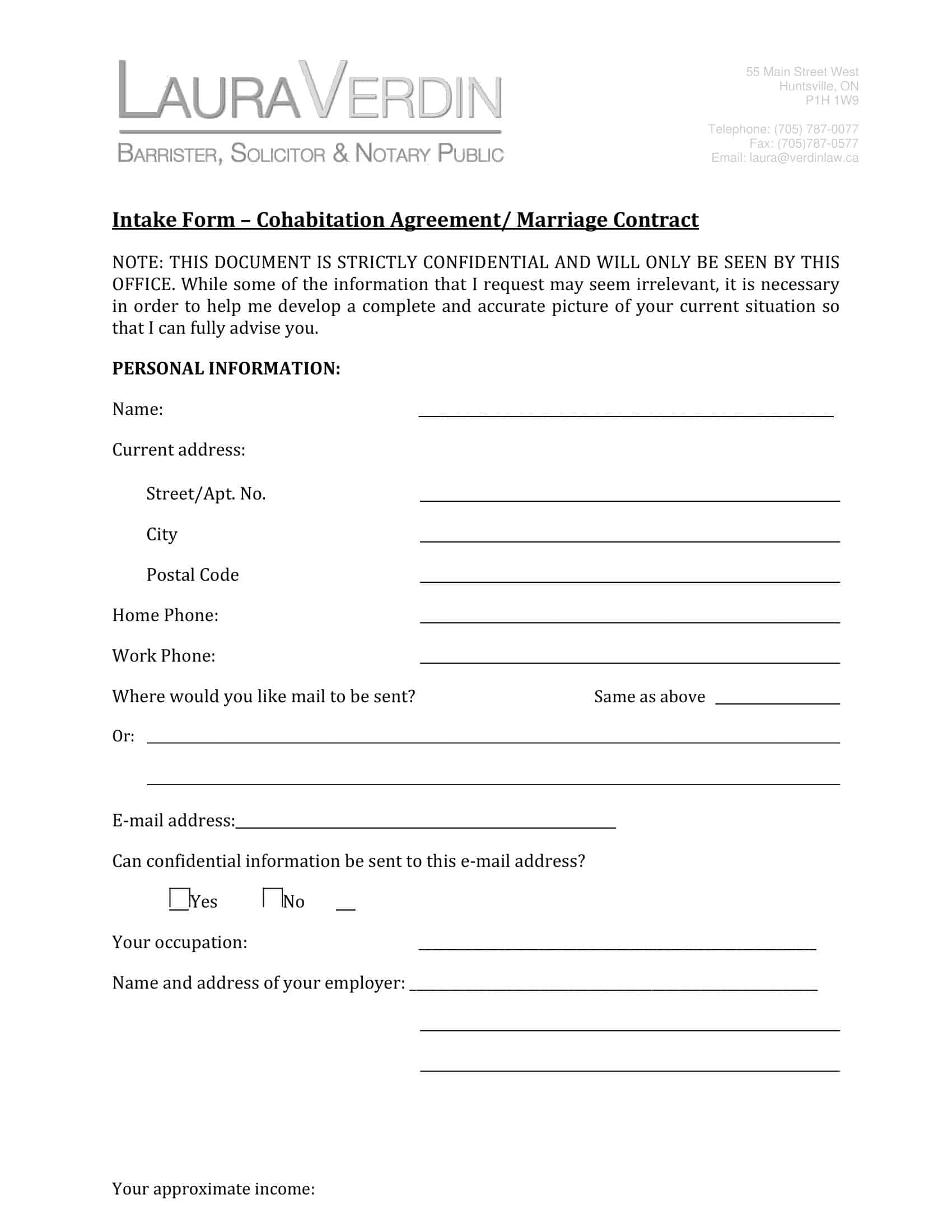
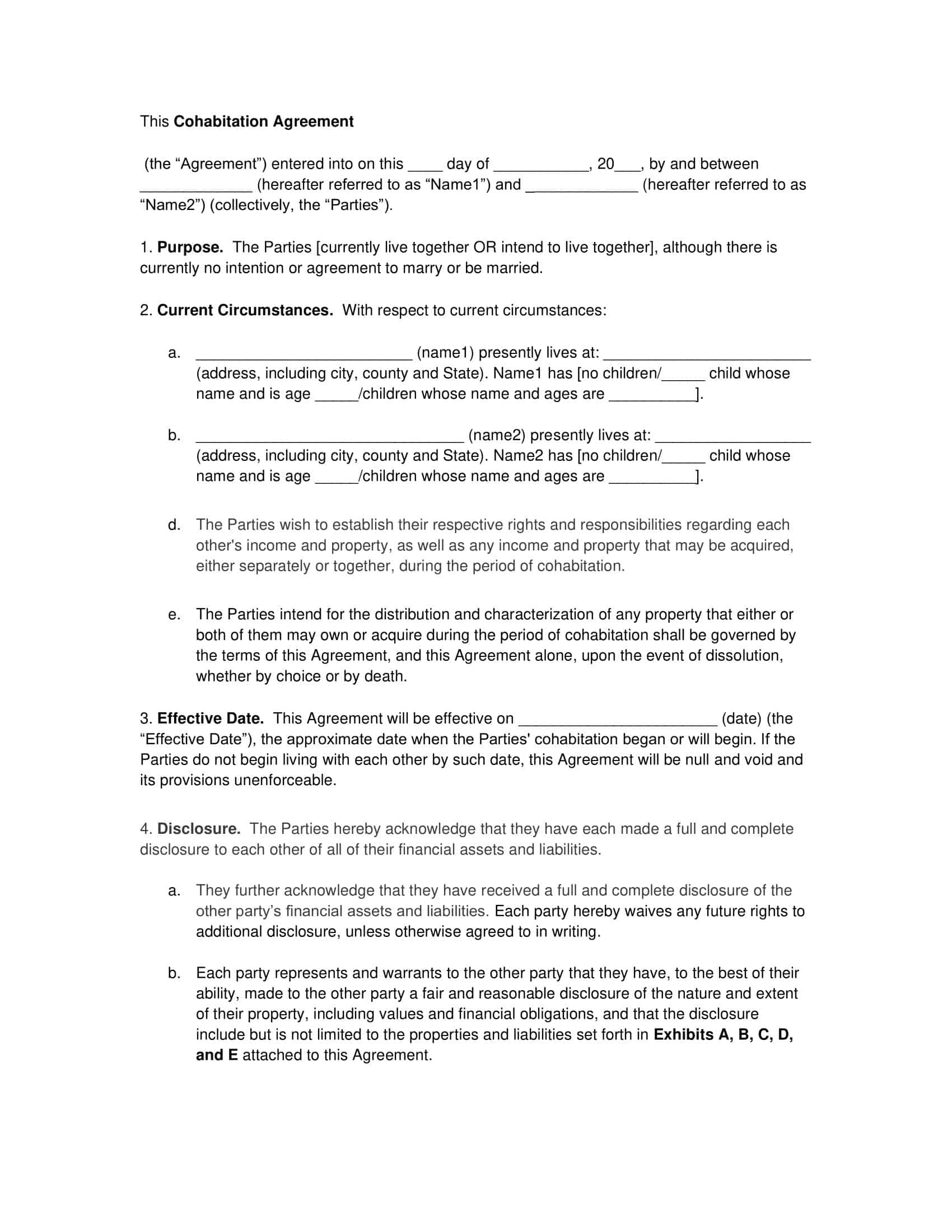





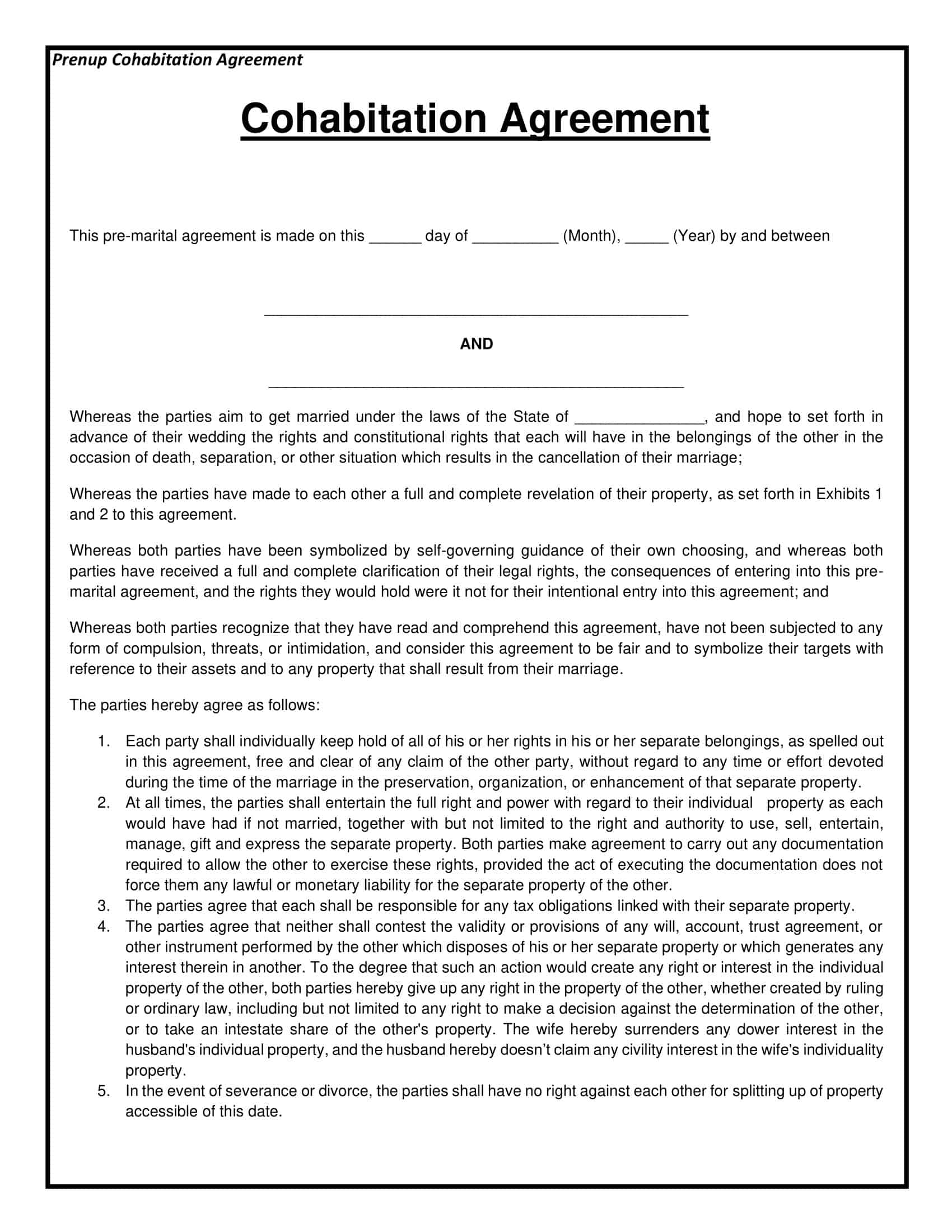
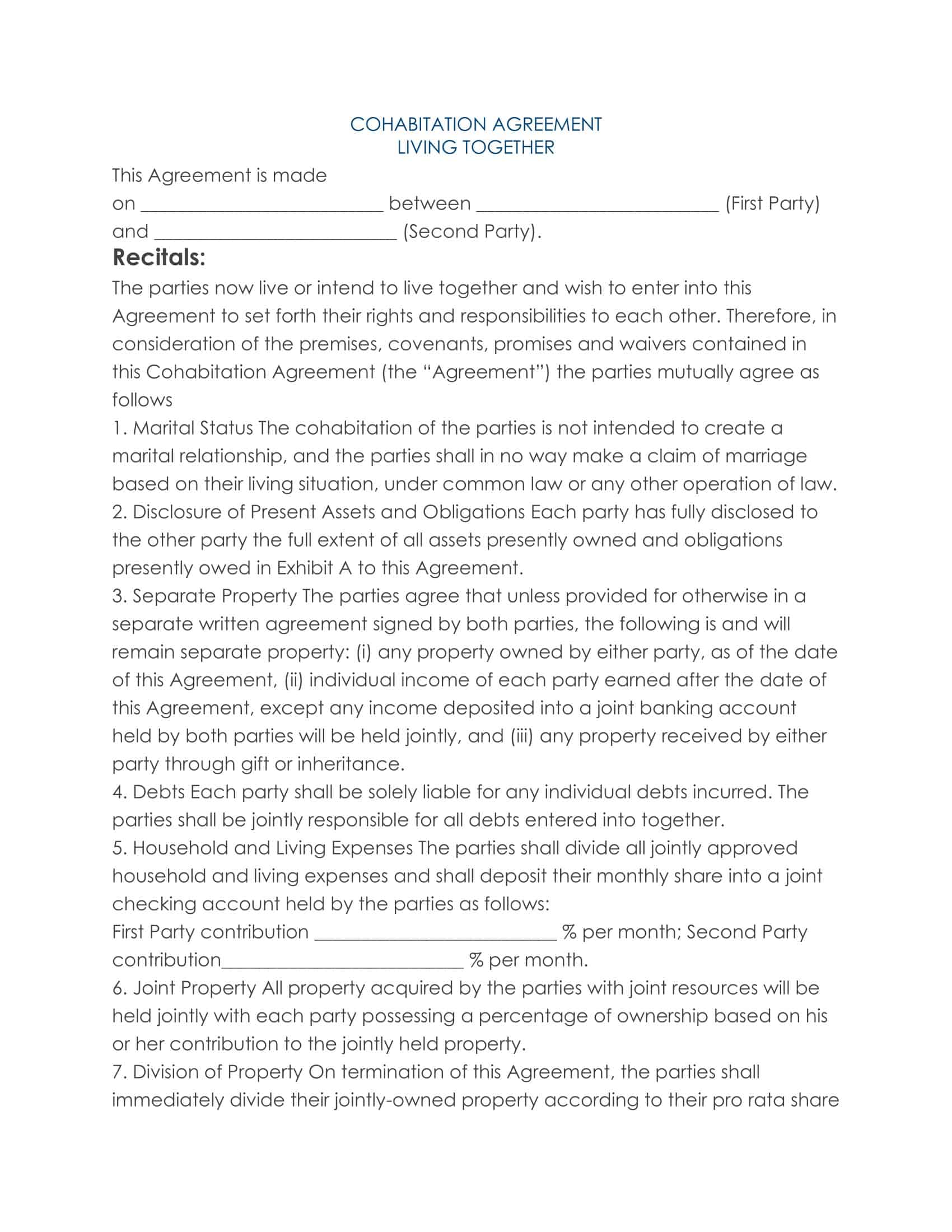

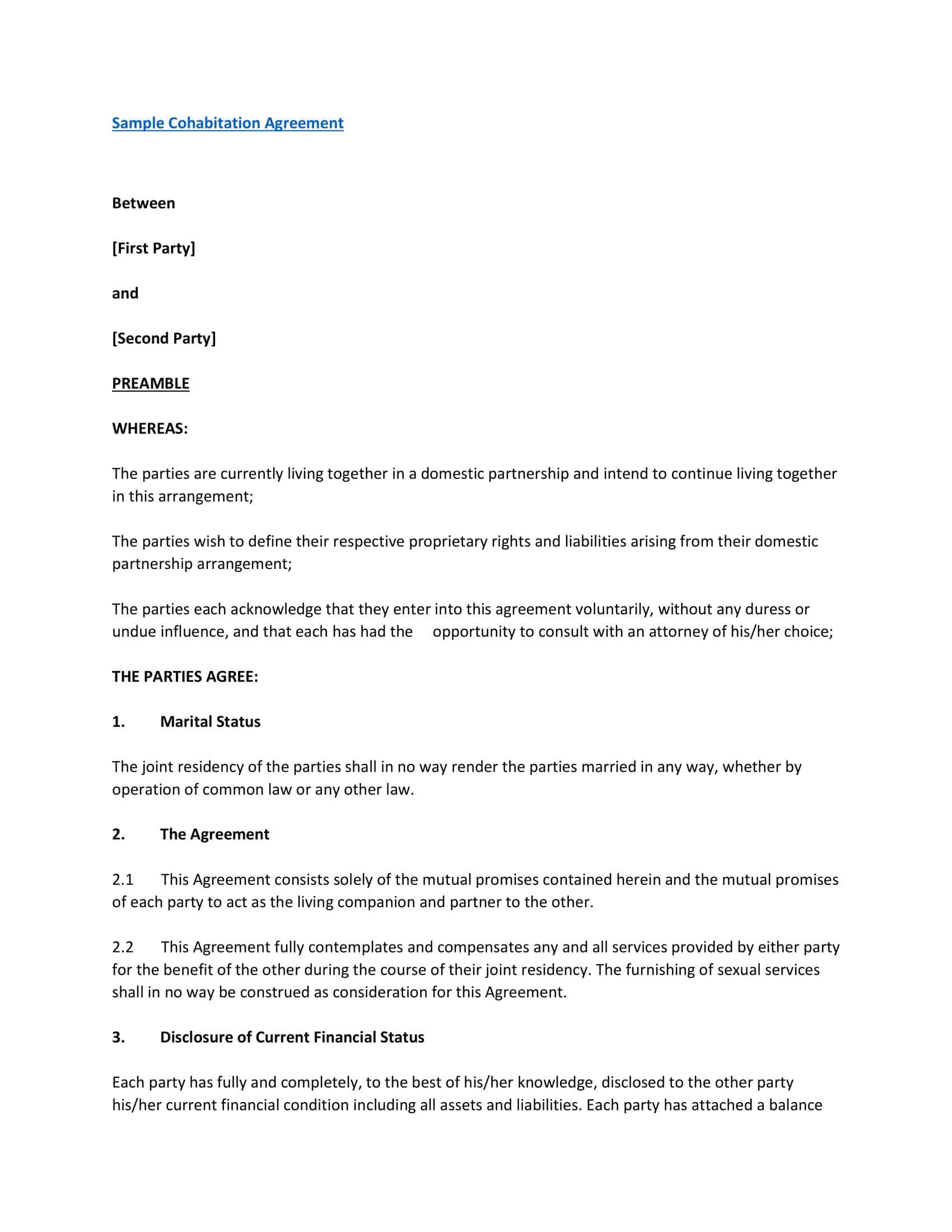
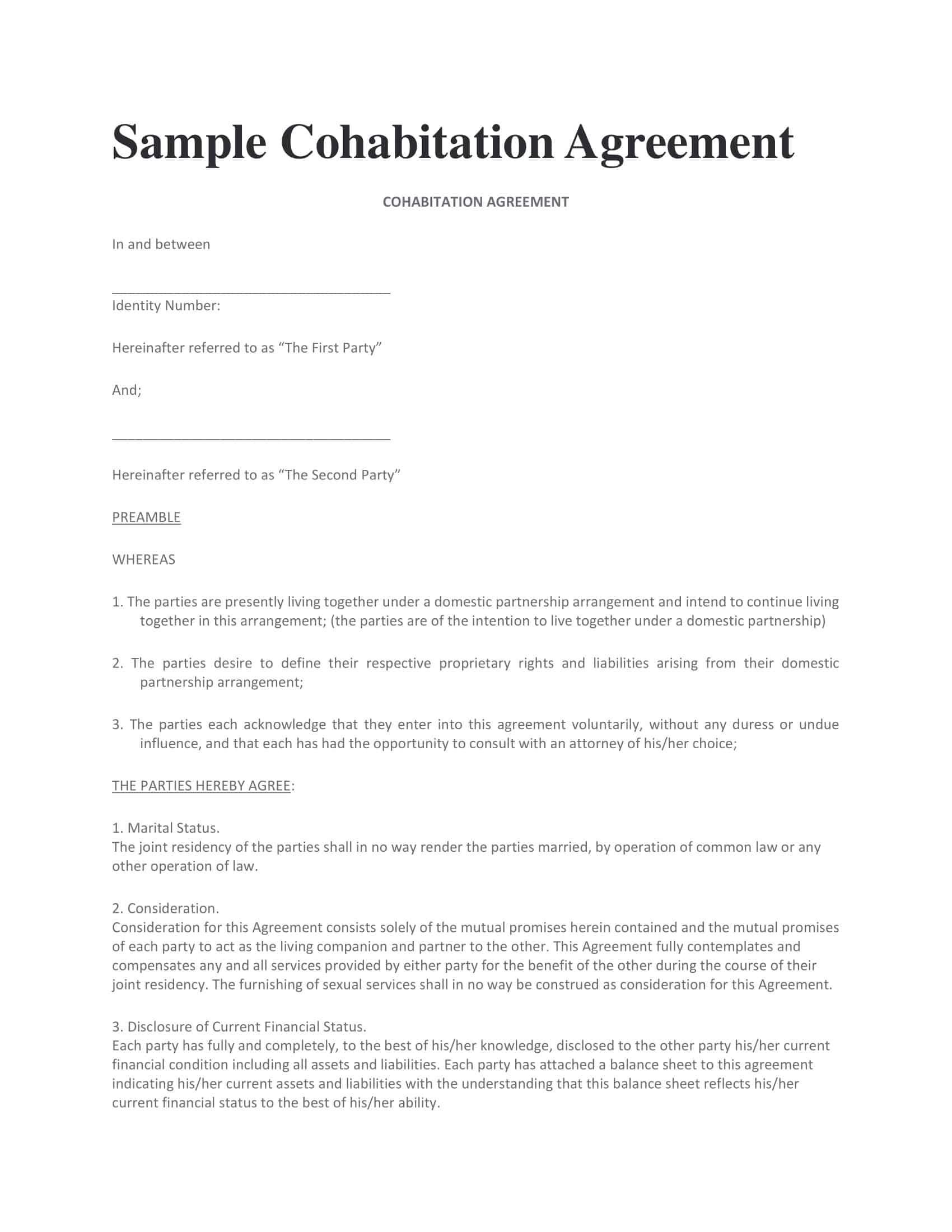


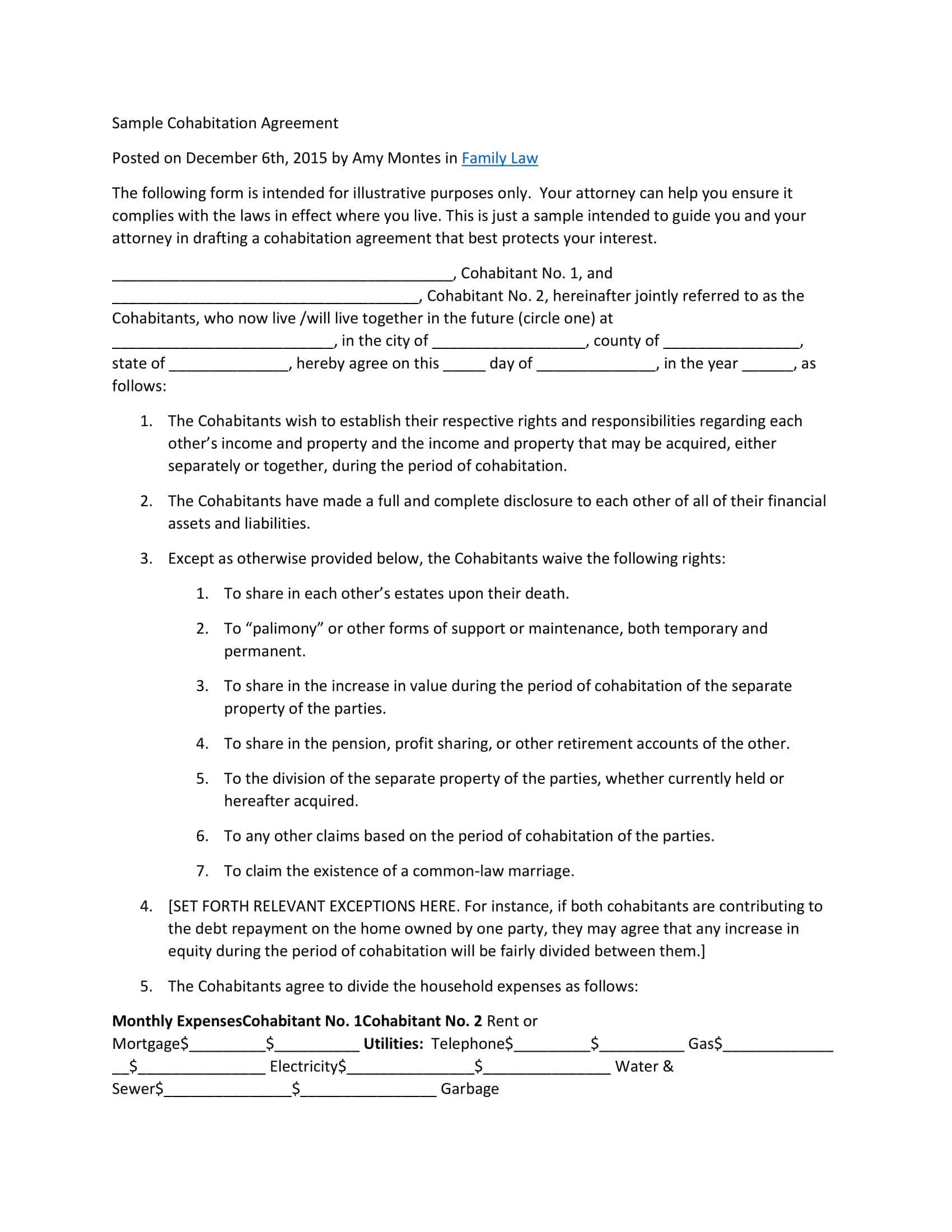




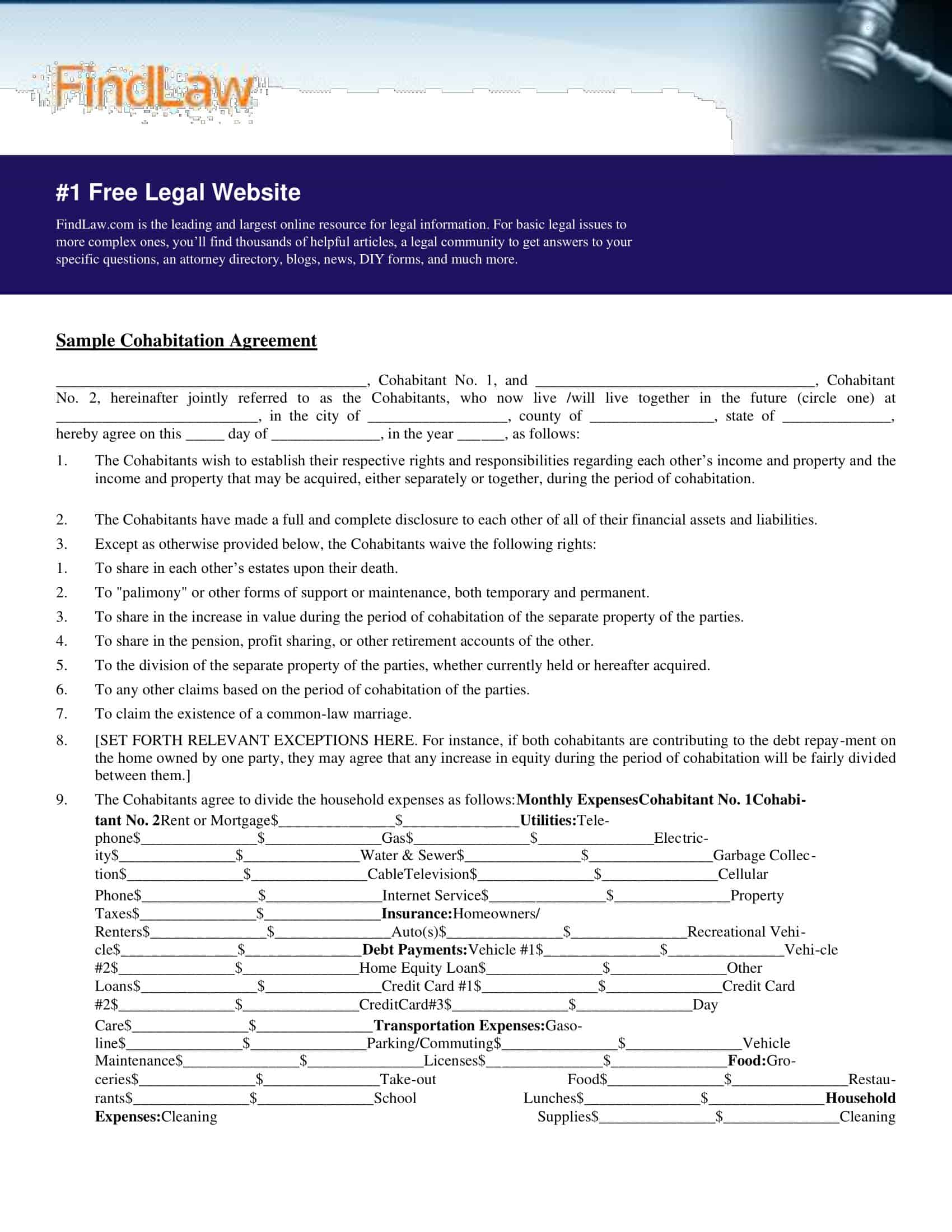



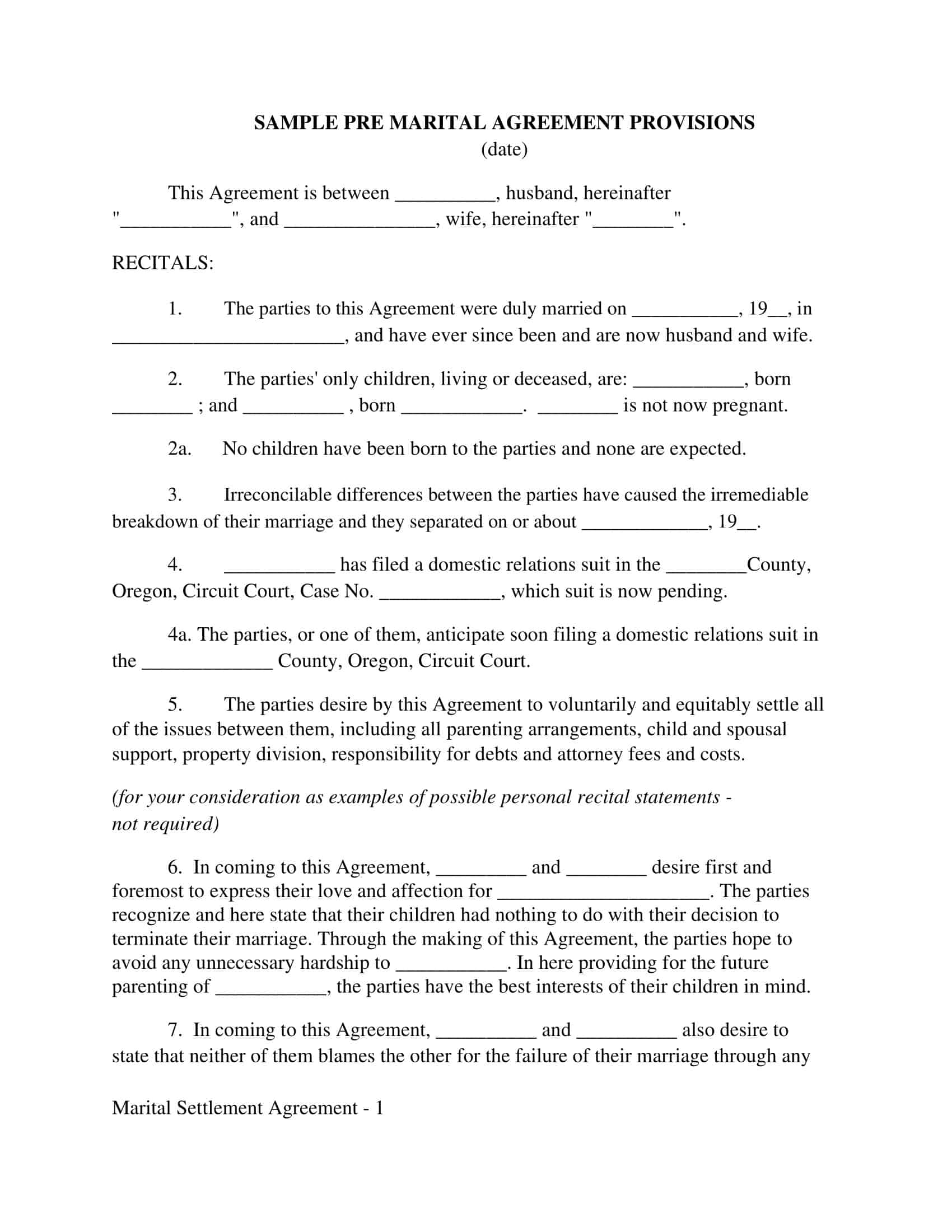






![Free Printable Roommate Agreement Templates [Word, PDF] 1 Roommate Agreement](https://www.typecalendar.com/wp-content/uploads/2023/06/Roommate-Agreement-150x150.jpg)
![Free Printable Payment Agreement Templates [PDF, Word] 2 Payment Agreement](https://www.typecalendar.com/wp-content/uploads/2023/05/Payment-Agreement-1-150x150.jpg)
![Free Printable Separation Agreement Templates [PDF, Word] 3 Separation Agreement](https://www.typecalendar.com/wp-content/uploads/2023/05/Separation-Agreement-1-150x150.jpg)
